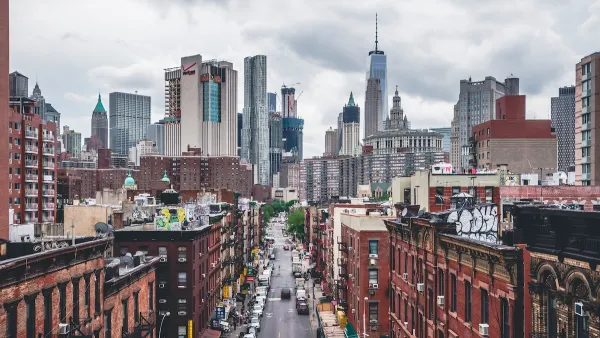As the presidential election season gears up, Mortimer B. Zuckerman's op-ed offers a cynical and weary electorate hope by invoking a transformative political vision of the role of the city.
For those unfamiliar with Bruce Katz and Jennifer Bradley’s 2013 book, The Metropolitan Revolution, the Editor-in-Chief of U.S. News & World Report offers a renewed rally cry.
"Leading metropolitan areas are more or less on their own since the federal government is in deep freeze," Mortimer B. Zuckerman states. He zeros in on partisan gridlock in Washington to explain why cities are assuming leadership in areas that were once the purview of the federal government, building the infrastructure and welcoming the communities that create the innovation clusters that drive 21st century economic development.
"Similar to the Tea Party and the Occupy movements, the metropolitan revolution is a child of the Great Recession," Katz and Bradley write. "Yet it is reasoned rather than emotional, leader driven rather than leaderless, born of pragmatism and optimism rather than despair and anger."
Unlike far-removed Washington politicians focused on two-year election cycles, city leaders plan for the long haul and "live daily with the consequences of their decisions," writes Zuckerman.
"The metropolitan revolution has only one logical conclusion: the inversion of the hierarchy of power in the United States," predict Katz and Bradley. They go so far as to write, "There is, in essence, no American (or Chinese or German or Brazilian) economy; rather, a national economy is a network of metropolitan economies."
While this outcome may seem alarmingly pre-Westphalian, the Brookings Institution authors point out that such a turn honors the ingenious nature of our political system.
"But what is happening in the United States today is also rooted in timeless and quintessential American values and is uniquely aligned with the disruptive nature of this young century and the manner and places in which people live their lives. The emerging revolution is not just a cyclical reaction but also a structural shift."
FULL STORY: The New American Heartland

Analysis: Cybertruck Fatality Rate Far Exceeds That of Ford Pinto
The Tesla Cybertruck was recalled seven times last year.

National Parks Layoffs Will Cause Communities to Lose Billions
Thousands of essential park workers were laid off this week, just before the busy spring break season.

Retro-silient?: America’s First “Eco-burb,” The Woodlands Turns 50
A master-planned community north of Houston offers lessons on green infrastructure and resilient design, but falls short of its founder’s lofty affordability and walkability goals.

Test News Post 1
This is a summary

Analysis: Cybertruck Fatality Rate Far Exceeds That of Ford Pinto
The Tesla Cybertruck was recalled seven times last year.

Test News Headline 46
Test for the image on the front page.
Urban Design for Planners 1: Software Tools
This six-course series explores essential urban design concepts using open source software and equips planners with the tools they need to participate fully in the urban design process.
Planning for Universal Design
Learn the tools for implementing Universal Design in planning regulations.
EMC Planning Group, Inc.
Planetizen
Planetizen
Mpact (formerly Rail~Volution)
Great Falls Development Authority, Inc.
HUDs Office of Policy Development and Research
NYU Wagner Graduate School of Public Service




























